Introduction
Over 80% of marketers already use some form of AI to optimize campaigns (HubSpot, 2025), highlighting its rapid adoption across industries. Artificial Intelligence (AI) in marketing refers to the use of machine learning, predictive analytics, and automation tools to understand customer behavior, personalize experiences, and improve decision-making. Unlike traditional strategies, AI-driven marketing delivers real-time insights and precision targeting that were once impossible. In today’s competitive digital landscape, businesses that fail to embrace AI risk falling behind. From smarter ad placements to automated customer journeys, AI has moved from being a luxury to a necessity. Simply put, AI is no longer optional—it’s the backbone of modern marketing success. Organizations looking to implement these strategies effectively can explore our AI Development Services.
- 80% of marketers already use AI tools to optimize campaigns (HubSpot, 2025).
- 72% of consumers engage only with personalized messaging powered by AI (McKinsey, 2024).
- Companies adopting AI in marketing achieve an average 40% increase in ROI (PwC, 2025).
1. What is AI Marketing?
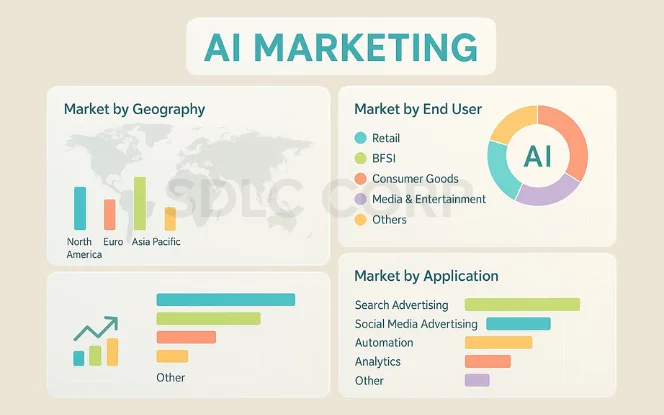
Definition of AI Marketing
Artificial Intelligence (AI) marketing is the application of machine learning (ML), natural language processing (NLP), and predictive analytics to enhance marketing strategies. Unlike traditional tools, AI systems can analyze large volumes of data, identify patterns, and predict future customer actions.
This allows businesses to go beyond simple automation and build marketing campaigns that are dynamic, adaptive, and customer-centric.
Core technologies behind AI marketing include:
- Machine Learning (ML): Continuously improves algorithms based on past performance.
- Natural Language Processing (NLP): Powers chatbots, voice assistants, and sentiment analysis.
- Predictive Analytics: Helps forecast customer behavior and optimize campaigns.
How AI Differs from Traditional Automation
Automation in marketing has been around for years, helping brands reduce repetitive tasks such as scheduling posts or sending predefined emails. However, automation is rule-based, meaning it executes instructions without learning or adapting.
AI, on the other hand, learns from data inputs and makes decisions in real-time. This makes AI-driven marketing more intelligent and outcome-focused compared to traditional automation.
Key differences:
- Traditional Automation
- Executes fixed workflows.
- Example: Triggering a welcome email when a new subscriber joins.
- Executes fixed workflows.
- AI Marketing
- Adapts and evolves using data insights.
- Example: Recommending personalized content based on browsing behavior.
- Adapts and evolves using data insights.
In short, automation follows static rules, while AI predicts and adapts.
Real-World Examples of AI in Marketing
AI marketing is already shaping some of the most successful platforms in the world. For instance, Netflix uses machine learning to study user behavior and provide personalized recommendations. This not only increases engagement but also reduces churn.
In advertising, Google Ads applies AI algorithms to manage bidding in real time. The system evaluates millions of signals per second to ensure ads reach the right audience at the right time, maximizing ROI.
E-commerce platforms such as Shopify leverage AI-driven personalization, suggesting products to customers based on purchase history and browsing patterns. This leads to better user experiences and higher conversion rates.
Why AI Marketing Matters for the Future
The future of marketing lies in data-driven intelligence. By harnessing AI, businesses can create campaigns that resonate with customers and evolve alongside their behavior.
Benefits of AI marketing include:
- Hyper-personalization at scale.
- Stronger customer retention.
- Accurate predictive insights for decision-making.
- Reduced manual effort for marketing teams.
Key Takeaway
AI marketing represents a technical evolution beyond automation. By combining ML, NLP, and predictive analytics, it empowers businesses to make smarter decisions, deliver tailored experiences, and remain competitive in an ever-changing digital landscape.
Read Also : Digital-Marketing-Company
2. Why AI Matters in Marketing Today
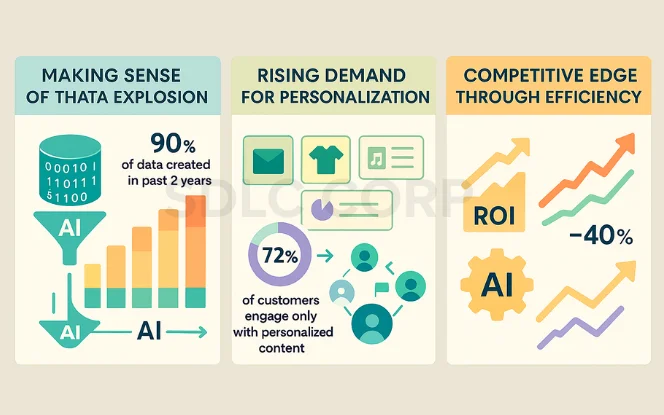
Making Sense of the Data Explosion
In the digital era, the amount of information generated is staggering. Reports suggest that nearly 90% of the world’s data has been created in just the past two years. Traditional analytics tools cannot process this volume effectively, but AI thrives in such environments.
By leveraging machine learning and predictive analytics, AI can filter noise, identify trends, and provide actionable insights that humans alone would struggle to uncover. This makes it indispensable for modern marketers dealing with massive, ever-growing datasets.
Rising Demand for Personalization
Today’s consumers expect brands to know their preferences and deliver tailored experiences. In fact, studies reveal that 72% of customers only engage with personalized content.
AI makes this possible by analyzing behavior, past purchases, and browsing patterns in real time. Instead of broad campaigns, marketers can create hyper-personalized recommendations that build trust and increase engagement.his growing demand for personalization also highlights the need for efficiency, which is where AI provides businesses with a competitive edge.
Examples of personalization with AI include:
- Recommending products on e-commerce platforms.
- Delivering personalized playlists or content feeds.
- Adjusting email campaigns based on user activity.
Competitive Edge Through Efficiency
AI not only enhances marketing effectiveness but also reduces operational costs. Businesses adopting AI tools report up to 40% cost savings while simultaneously improving ROI.
This dual advantage comes from automation of repetitive tasks, optimized ad spending, and smarter resource allocation. Marketers can shift their focus from manual execution to strategic planning and creative innovation.
Key advantages AI provides to marketers today:
- Cuts marketing costs through efficiency.
- Maximizes ROI with data-driven insights.
- Gives businesses a technological edge over competitors.
Final Thought
AI is no longer a futuristic concept it’s a critical driver of modern marketing success. By interpreting massive datasets, enabling personalization, and delivering cost-efficient results, AI helps brands stay relevant and competitive in a fast-changing landscape.
3. Core Use Cases of AI in Marketing
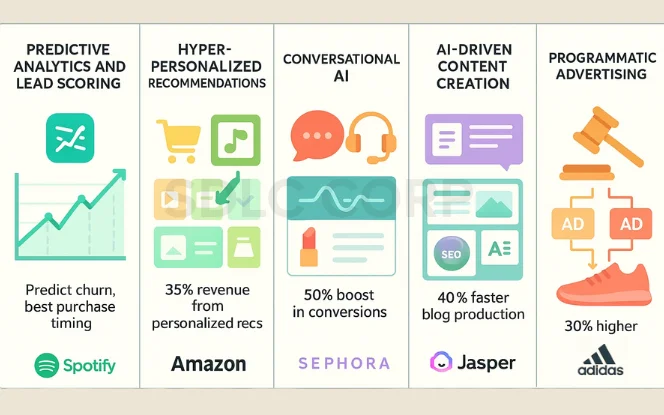
Artificial Intelligence is not just a buzzword—it’s transforming marketing practices across industries. From predictive analytics to conversational AI, businesses are applying AI tools to streamline workflows, cut costs, and maximize ROI. Below are the most impactful applications today.
Predictive Analytics & Lead Scoring
AI-driven predictive models analyze customer data to forecast future behavior with high accuracy. Instead of waiting for patterns to emerge, businesses can act proactively.
- Example: AI can identify customers with a high churn risk or predict the best timing for purchase outreach.
- Mini Case Study: Spotify uses predictive analytics to recommend playlists, leading to higher user engagement and longer session times.
Hyper-Personalized Recommendations
Modern personalization goes far beyond demographics. AI systems use behavioral micro-segmentation to tailor experiences at an individual level.
- Streaming platforms like Amazon and Spotify are excellent examples—recommending products, songs, or playlists based on browsing history, listening habits, or purchase behavior.
- Mini Case Study: Amazon reports that personalized product recommendations contribute to 35% of its total revenue.
Conversational AI (Chatbots & Virtual Assistants)
AI-powered chatbots and virtual assistants use Natural Language Processing (NLP) to provide real-time, human-like interactions.
- Available 24/7, they can answer FAQs, process orders, and handle support queries.
- Companies deploying conversational AI report a reduction of up to 80% in cost per query, while maintaining high customer satisfaction.
- Mini Case Study: Sephora’s chatbot improved product match accuracy and boosted conversions by 50%.
This makes chatbots not just a cost-saving tool but also a scalable engagement channel.
AI-Driven Content
Content is still king, but producing it at scale is a challenge. AI tools now help create, optimize, and distribute content more efficiently.
- Generators: Tools like Jasper, Copy.ai, and Writesonic assist in drafting blogs, ad copy, and email campaigns.
- Content Scoring: AI platforms assess readability, keyword density, and SEO performance to improve rankings.
- Mini Case Study: Jasper helped HubSpot scale blog production, reducing content creation time by 40%.
- Dynamic Content: Marketers can deploy AI for real-time ad copy testing and adaptive landing pages that adjust based on user behavior.
This ensures not only faster content creation but also data-driven optimization.
Programmatic Advertising
AI has revolutionized media buying through real-time bidding algorithms. Instead of manually negotiating ad placements, AI systems automatically allocate budgets to the highest-performing ad spaces.
- Impact: Brands achieve greater ad placement efficiency, lower Cost Per Mille (CPM), and higher return on ad spend (ROAS).
- Example: Platforms like Google Ads Smart Bidding and Albert AI optimize campaign performance automatically.
- Mini Case Study: Adidas leveraged programmatic AI to improve ad ROI by 30% in its digital campaigns.
AI in Action: Tools Across Marketing Areas
| Marketing Area | AI Tool Example | Impact |
|---|---|---|
| Content Creation | Jasper, Copy.ai | Faster blogs, ads, emails |
| Predictive Analytics | HubSpot AI, Salesforce Einstein | Better targeting, lead scoring |
| Chatbots | Drift, Intercom AI | 24/7 engagement, lower churn |
| Ads & Media Buying | Albert AI, Google Smart Bidding | Higher ROI, reduced ad spend waste |
Key Insight
AI use cases span every stage of the marketing funnel from attracting prospects with predictive insights to retaining customers through personalized engagement.This growing demand for personalization also highlights the need for efficiency, which is where AI provides businesses with a competitive edge
4. Advantages of AI in Marketing
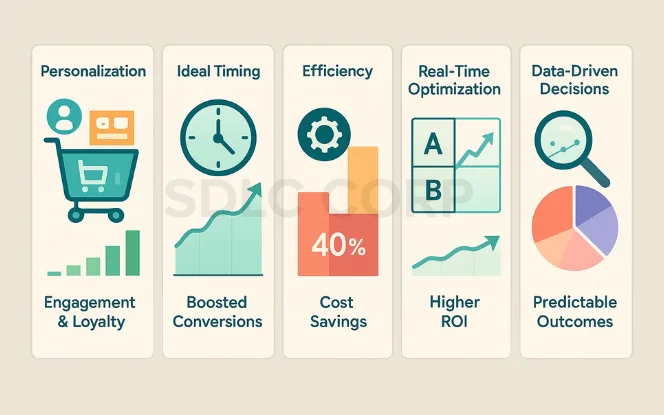
Artificial Intelligence is more than just a trend in digital marketing it delivers measurable business value. By combining data analysis, automation, and real-time decision-making, AI helps marketers achieve stronger results with fewer resources. Below are the core advantages and their direct business gains.
Laser-Focused Personalization
AI enables hyper-personalized campaigns that go far beyond basic demographic targeting. By analyzing behavioral data, purchase history, and browsing patterns, AI creates experiences tailored to each customer.
Business Impact: Drives higher engagement, stronger loyalty, and greater lifetime customer value.
Predicting Ideal Timing for Conversions
Knowing when to reach customers is just as important as knowing what to offer. AI uses predictive analytics to determine the best time to send emails, show ads, or make recommendations.
Business Impact: Boosts conversion rates and reduces wasted ad spend.
Efficiency and Cost Reduction
Traditional marketing often requires heavy manual effort planning campaigns, analyzing results, and adjusting strategies. AI automates these processes at scale.
Business Impact: Cuts operational costs and enables up to 40% savings in marketing budgets.
Real-Time Optimization
AI eliminates the slow, manual nature of traditional A/B testing. With machine learning models, campaigns can be tested and optimized in real time.
Business Impact: Delivers higher ROI through continuous performance improvements.
Data-Driven Decisions
Instead of relying on gut feeling or guesswork, marketers can lean on AI-powered insights. These insights stem from analyzing millions of data points to identify what truly works.
Business Impact: Reduces risk and ensures more predictable campaign outcomes.
Final Thought
The advantages of AI in marketing are clear: better targeting, improved efficiency, lower costs, and stronger ROI. Businesses that adopt AI now gain a competitive edge, while those that delay risk falling behind in a data-driven market.
5. Limitations & Risks of AI in Marketing
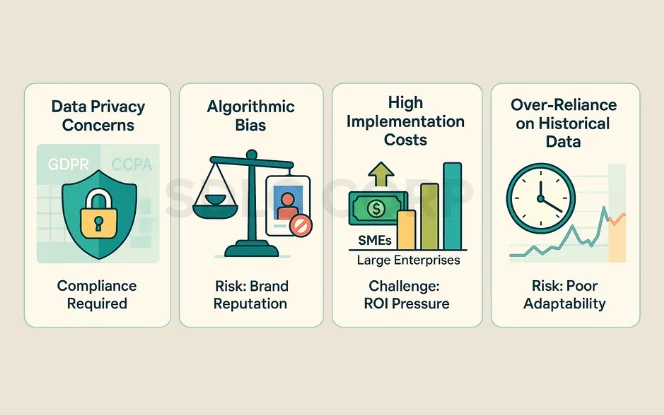
While AI offers transformative advantages, it’s not without challenges. Businesses must be aware of its limitations and risks to make informed, ethical, and cost-effective decisions.
Data Privacy Concerns
AI marketing thrives on large datasets, but this raises significant privacy and compliance issues. Regulations like GDPR (General Data Protection Regulation) in Europe and CCPA (California Consumer Privacy Act) in the U.S. enforce strict rules on how consumer data can be collected and processed.
- Risk: Non-compliance can lead to heavy fines and reputational damage.
- Business Impact: Marketers must ensure compliance with laws like GDPR and CCPA to avoid fines and loss of trust.
Algorithmic Bias and Reputational Risks
AI systems are only as unbiased as the data they are trained on. If training datasets carry inherent biases, the outputs can unintentionally discriminate against specific demographics.
- Example: Biased ad targeting that excludes certain age groups or genders.
- Business Impact: Unchecked bias can damage brand reputation and create legal exposure.
High Implementation Costs for SMEs
For small and mid-sized enterprises (SMEs), adopting advanced AI solutions can be expensive. Costs include data infrastructure, AI platforms, skilled talent, and ongoing maintenance.
- Challenge: Large enterprises can absorb these costs, but SMEs may struggle to see immediate ROI.
- Business Impact: Without a clear ROI strategy, AI adoption may strain budgets and hinder growth.
Over-Reliance on Historical Patterns
AI relies heavily on historical data to predict future outcomes. While effective, this creates limitations in fast-changing environments where past trends don’t align with new realities.
- Risk: Campaigns may fail during sudden market shifts or unexpected consumer behavior changes.
- Business Impact: Heavy dependence on past data may result in poor adaptability to new market shifts.
Key Insight
AI in marketing is powerful, but it is not a silver bullet. Success depends on striking the right balance between automation and human oversight, ensuring compliance, managing costs, and actively mitigating risks like bias and over-dependence on data.
Check Out: How to Set Up Email Marketing in WordPress?
6. Best AI Tools for Marketing
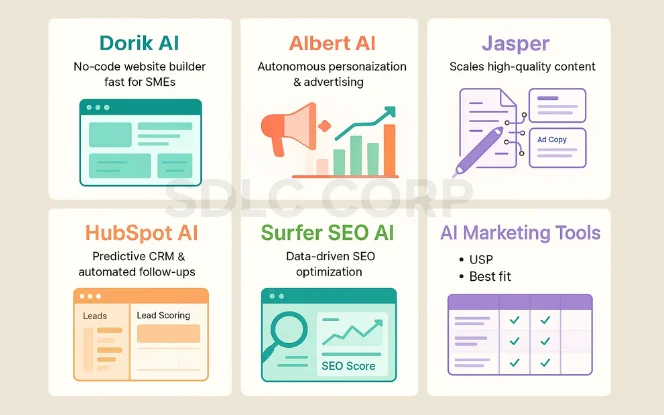
As AI adoption accelerates, the marketing ecosystem is witnessing a surge in specialized tools designed to optimize different aspects of campaigns—from website building to advertising automation. Below are some of the top AI-powered tools in 2025 that marketers should consider.
Dorik AI – No-Code AI Website Builder
Dorik AI allows businesses to build professional websites without coding. Its AI-driven design system generates layouts, content blocks, and visuals in minutes, making it ideal for startups and SMEs with limited resources.
- USP: Simplifies web development with AI-generated templates.
- Best Fit: Small businesses seeking fast, cost-effective website creation.
Albert AI – Personalization & Advertising
Albert AI specializes in AI-driven personalization and advertising automation. It continuously analyzes campaign performance and optimizes in real time, helping brands maximize their ad spend efficiency.
- USP: Fully autonomous ad campaign optimization.
- Best Fit: Companies running multi-channel ad campaigns looking to boost ROI.
Jasper – AI Content Generator
Jasper has become a go-to tool for marketers who need scalable, high-quality content. From blog articles to ad copy, Jasper uses NLP to generate engaging text tailored to brand voice and SEO goals.
- USP: Scales content creation without sacrificing quality.
- Best Fit: Content marketers and agencies focused on blogs, ads, and email marketing.
HubSpot AI – Predictive CRM & Lead Scoring
HubSpot integrates AI into its CRM platform, providing predictive lead scoring, automated follow-ups, and customer insights. This ensures sales and marketing teams focus on the prospects most likely to convert.
- USP: Seamless integration of AI into CRM workflows.
- Best Fit: Businesses needing an all-in-one CRM + AI marketing suite.
Surfer SEO AI – SEO Optimization
Surfer SEO AI enhances content optimization for search engines. It analyzes top-ranking pages, suggests keyword improvements, and provides real-time scoring to maximize organic visibility.
- USP: Data-driven SEO optimization with actionable recommendations.
- Best Fit: Digital marketers aiming to rank content higher on Google.
Comparison Table: Best AI Tools for 2025
| AI Tool | USP | Best Fit Use Case |
|---|---|---|
| Dorik AI | No-code AI website builder | Quick website creation for startups/SMEs |
| Albert AI | Autonomous personalization & ad bidding | Multi-channel advertising optimization |
| Jasper | AI-powered content generation | Scaling blogs, ads, and email campaigns |
| HubSpot AI | Predictive CRM + lead scoring | Integrated CRM and sales-marketing workflows |
| Surfer SEO AI | SEO-driven content optimization | Ranking content higher in organic search |
Key Insight
The best AI marketing tools in 2025 are specialized yet complementary. Choosing the right mix whether it’s for content, SEO, CRM, or advertising will depend on your business model, budget, and growth strategy.
7. Real-World Examples of AI Marketing Success
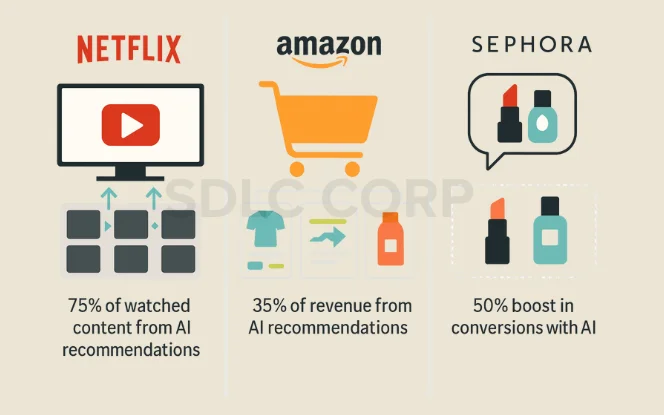
The impact of AI in marketing isn’t just theoretical—it’s already delivering measurable results for global brands. By leveraging AI-driven personalization, recommendation systems, and conversational tools, these companies have transformed customer engagement and revenue growth.
Netflix: Personalized Recommendations Driving Engagement
Netflix uses machine learning algorithms to analyze viewing history, search patterns, and engagement metrics. The result is a highly personalized recommendation engine that keeps users hooked.
- Business Outcome: Nearly 75% of all content watched on Netflix comes from AI-powered recommendations.
- Impact: Increased watch time, reduced churn, and stronger customer loyalty.
Amazon: Revenue from Personalized Product Suggestions
Amazon applies AI to micro-segment customers and recommend products in real time. The system uses behavioral data, past purchases, and browsing history to generate highly relevant suggestions.
- Business Outcome: Personalized recommendations contribute to 35% of Amazon’s total revenue.
- Impact: Higher conversion rates and massive scalability in e-commerce personalization.
Sephora: Conversational AI for Smarter Shopping
Beauty retailer Sephora integrates AI chatbots to assist customers in finding the right products. The chatbot leverages NLP-powered interactions to match products with individual preferences, skin types, and needs.
- Business Outcome: Conversions improved by 50% after implementing AI-powered product matching.
- Impact: Enhanced customer experience and more confident purchase decisions.
Key Takeaway:
These cases prove that AI not only enhances engagement and efficiency but also drives measurable revenue growth across industries.
8. Can AI Replace Digital Marketers?
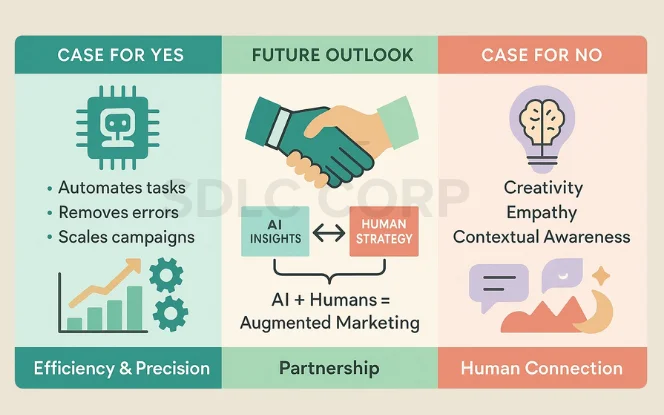
The rise of AI in marketing has sparked a heated debate: will machines eventually take over the roles of human marketers? While AI offers unmatched efficiency in certain areas, it still has clear limitations that prevent it from fully replacing human expertise.
The Case for “Yes”
AI excels at handling data-heavy, repetitive, and analytical tasks that would overwhelm human teams. From predictive analytics to ad bidding, it delivers faster, more precise results.
- Automates time-consuming tasks like segmentation, reporting, and A/B testing.
- Increases accuracy by removing human errors in data analysis.
- Allows marketing teams to scale campaigns without significantly increasing costs.
Bottom Line: For efficiency and precision, AI outperforms humans.
The Case for “No”
Despite its power, AI lacks creativity, empathy, and contextual understanding—all essential for impactful marketing. Storytelling, brand positioning, and emotional connections remain uniquely human strengths.
- Cannot replicate the cultural awareness needed for nuanced campaigns.
- Struggles with originality and creative brainstorming.
- Risks brand reputation if overused without human oversight.
Bottom Line: For brand storytelling and emotional resonance, human marketers remain irreplaceable.
The Future: Augmented Marketing
The most likely scenario is not replacement but collaboration. AI will handle data-driven processes, while marketers focus on strategy, creativity, and customer relationships.
- AI provides insights → Humans craft compelling narratives.
- AI optimizes in real time → Humans adapt campaigns to shifting contexts.
- Together, this creates what many call “Augmented Marketing.”
Key Insight:
The future of marketing is not AI vs. Humans, but AI + Humans—a partnership that combines precision with creativity.
9. Future Trends of AI in Marketing (2025–2030)
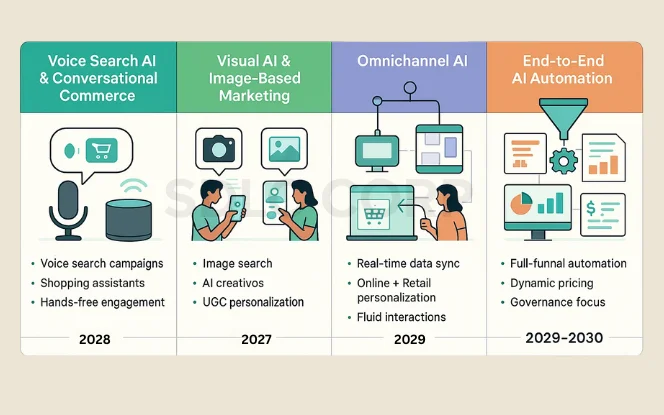
As AI technology continues to mature, its role in marketing will expand far beyond current use cases. Between 2025 and 2030, we can expect AI to drive innovation in customer experience, personalization, and automation. Here are the most promising future trends.
Voice Search AI and Conversational Commerce
With the growing popularity of smart speakers and voice assistants, consumers are increasingly using voice search to find products and services. By 2030, conversational commerce will become a major channel for digital marketing.
- Brands will optimize campaigns for voice search queries.
- Voice-enabled shopping assistants will guide customers through product discovery to checkout.
- Customer engagement will shift toward hands-free, natural interactions.
- Timeline Marker: Expected to dominate customer interactions by 2028.
Visual AI and Image-Based Marketing
Visual AI is transforming how consumers discover products. From AI-powered image search to AI-generated creative assets, marketers will lean on visuals more than ever.
- Shoppers will use images instead of keywords to search for products.
- Brands will deploy AI-generated ad creatives and product visuals at scale.
- Visual AI will fuel personalization by analyzing user-generated content (UGC) and engagement trends.
- Timeline Marker: Projected widespread adoption by 2027.
Omnichannel AI for Seamless Personalization
Future marketing will be defined by consistency across channels. Omnichannel AI will ensure every touchpoint social media, email, chatbots, or in-store is part of a unified customer journey.
- AI will synchronize customer data across platforms in real time.
- Personalization will extend from online ads to physical retail experiences.
- Consumers will expect fluid, connected interactions across devices.
- Timeline Marker: Becomes standard across industries by 2029.
End-to-End AI Automation
The next decade will see AI manage the entire marketing funnel, from customer acquisition to billing and retention. This will go beyond isolated tools, evolving into full-stack automation.
- Lead scoring, nurturing, and conversions handled autonomously.
- Dynamic pricing and personalized billing powered by AI.
- Marketing teams will shift focus to strategy, governance, and ethical oversight.
- Timeline Marker: Expected to reach maturity between 2029–2030.
Key Insight
Between 2025 and 2030, AI in marketing will evolve from being a supporting tool to becoming the central nervous system of digital marketing operations. Brands that embrace these trends early will lead in customer engagement, personalization, and efficiency.
10. Implementation Best Practices for AI in Marketing
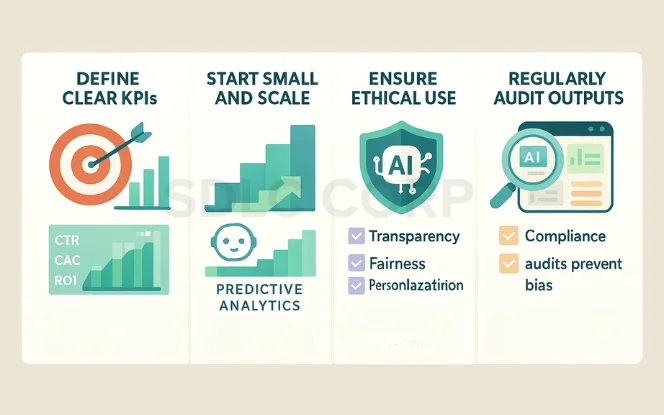
Adopting AI in marketing requires more than just choosing the right tools. Success depends on strategic planning, ethical practices, and continuous monitoring. By following proven best practices, businesses can maximize ROI while minimizing risks.
Define Clear KPIs Before Deployment
AI initiatives should start with a well-defined set of Key Performance Indicators (KPIs). Whether the goal is improving conversion rates, reducing acquisition costs, or boosting customer retention, clear metrics help measure success.
- Align AI goals with broader business objectives.
- Track measurable outcomes such as CTR, CAC, or ROI.
Start Small and Scale Gradually
Jumping into large-scale AI adoption can overwhelm teams and budgets. Instead, businesses should start small with manageable projects like chatbots or product recommendations before expanding into predictive analytics or full automation.
- Pilot projects help test feasibility and ROI.
- Early wins build confidence for larger-scale deployment.
Ensure Ethical Use of AI
AI marketing must be built on transparency, fairness, and explainability. Customers should know how their data is being used, and businesses must avoid hidden algorithms that lead to biased results.
- Clearly communicate data usage policies.
- Apply fairness checks in targeting and personalization models.
Key Takeaway
Implementing AI in marketing is most effective when approached with clear goals, gradual scaling, ethical safeguards, and ongoing audits. Businesses that follow these best practices will gain the benefits of AI while maintaining customer trust and regulatory compliance.
Conclusion
Artificial Intelligence in marketing is no longer a futuristic concept it’s an essential driver of growth today. From predictive analytics to hyper-personalization, AI is helping businesses make smarter, faster, and more impactful marketing decisions. However, the real power lies in combining machine intelligence with human creativity. AI provides the precision, efficiency, and scalability, while human marketers bring empathy, storytelling, and brand vision. Together, they create unstoppable marketing strategies that resonate with customers.Discover how AI Development Solutions can help you adopt these strategies today.
Ready to scale with AI? Start by adopting one tool today and build the foundation for a smarter, data-driven marketing future
FAQs
Q1: What is AI marketing and how does it work?
AI marketing uses machine learning, natural language processing, and predictive analytics to automate and optimize marketing campaigns. It works by analyzing data, predicting customer behavior, and delivering personalized content at scale.
Q2: What are the top AI tools for marketers in 2025?
Some of the best AI tools include Dorik AI (website builder), Jasper (content generation), HubSpot AI (CRM + lead scoring), Surfer SEO AI (SEO optimization), and Albert AI (programmatic advertising).
Q3: Can AI replace digital marketers?
AI can automate data-heavy tasks and improve precision, but it cannot replace creativity, empathy, and brand storytelling. The future is a hybrid model called Augmented Marketing, where AI and humans work together.
Q4: What are the biggest benefits of AI in marketing?
Key benefits include hyper-personalization, predictive insights, cost reduction, real-time optimization, and smarter data-driven decisions—all leading to higher ROI.
Q5: What are the risks of using AI in marketing?
Risks include data privacy concerns, algorithmic bias, high implementation costs for SMEs, and over-reliance on historical data patterns. Businesses must ensure ethical, transparent, and compliant AI practices.

















